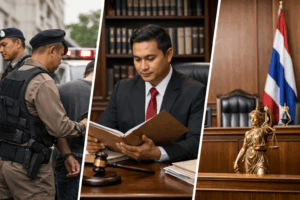In the bustling business environment of Thailand, compliance with labor laws is a cornerstone for sustainable and ethical operations. This comprehensive guide aims to unravel the intricacies of labor laws in the country, covering critical aspects such as working hours, wages, employee benefits, and workplace safety. Additionally, we’ll explore the pivotal role of a seasoned lawyer in Bangkok in ensuring businesses navigate these legal waters successfully.
Understanding Labor Laws in Thailand:
Working Hours and Overtime Regulations:
Standard Working Hours: Labor laws in Thailand stipulate standard working hours to protect the well-being of employees. Understanding and adhering to these regulations is crucial for businesses to maintain compliance.
Overtime Compensation: Proper compensation for overtime work is a key aspect of labor laws. Employers must ensure that employees are fairly remunerated for any hours worked beyond the standard schedule.
Wage Regulations:
Minimum Wage Requirements: Thailand has minimum wage requirements set by region and industry. Adhering to these standards is essential for businesses to avoid legal complications and ensure fair compensation for employees.
Wage Payment Timing: Labor laws dictate the frequency and timing of wage payments. Employers must comply with these regulations to prevent legal challenges and maintain a positive working relationship with employees.
Employee Benefits and Leave Policies:
Social Security Contributions: Compliance with social security contributions is mandatory. Employers must ensure that the required contributions are made on behalf of their employees.
Annual Leave and Holidays: Understanding and implementing policies related to annual leave and holidays is crucial. Adhering to labor laws in this regard fosters a healthy work-life balance for employees.
Workplace Safety and Health:
Occupational Safety Standards: Businesses must prioritize workplace safety by adhering to occupational safety standards. Failure to do so not only jeopardizes employee well-being but can also lead to legal consequences.
Emergency Preparedness: Having robust emergency preparedness plans in place is essential. Labor laws often require businesses to take proactive measures to protect employees in the event of accidents or emergencies.
The Role of a Lawyer in Bangkok:
Given the complexity of labor laws in Thailand, businesses can greatly benefit from the expertise of a lawyer in Bangkok. Here’s how legal professionals can assist:
Legal Compliance Audits:
Lawyers can conduct thorough legal compliance audits to ensure businesses adhere to all labor laws, identifying and rectifying any potential areas of non-compliance.
Contractual Agreements and Documentation:
Drafting and reviewing employment contracts is a critical aspect of legal compliance. Lawyers can ensure that these agreements align with labor laws, protecting the rights and interests of both employers and employees.
Dispute Resolution:
In the event of labor disputes, having a lawyer in Bangkok with expertise in labor law is invaluable. Legal professionals can guide businesses through dispute resolution processes and represent their interests in legal proceedings if necessary.
Policy Development and Updates:
Lawyers can assist in developing and updating internal policies to align with evolving labor laws, ensuring businesses remain proactive in compliance.
Conclusion:
As businesses in Thailand strive for success, navigating the labyrinth of labor laws is non-negotiable. Ensuring compliance not only upholds the rights and well-being of employees but also safeguards the interests of employers. Engaging the services of a knowledgeable lawyer in Bangkok is a strategic move toward legal compliance, dispute prevention, and overall business success in the dynamic landscape of labor regulations.
Contact : Siam Center Law Group by calling +66(0) 2 648 5041, +66(0) 2 648 5042





